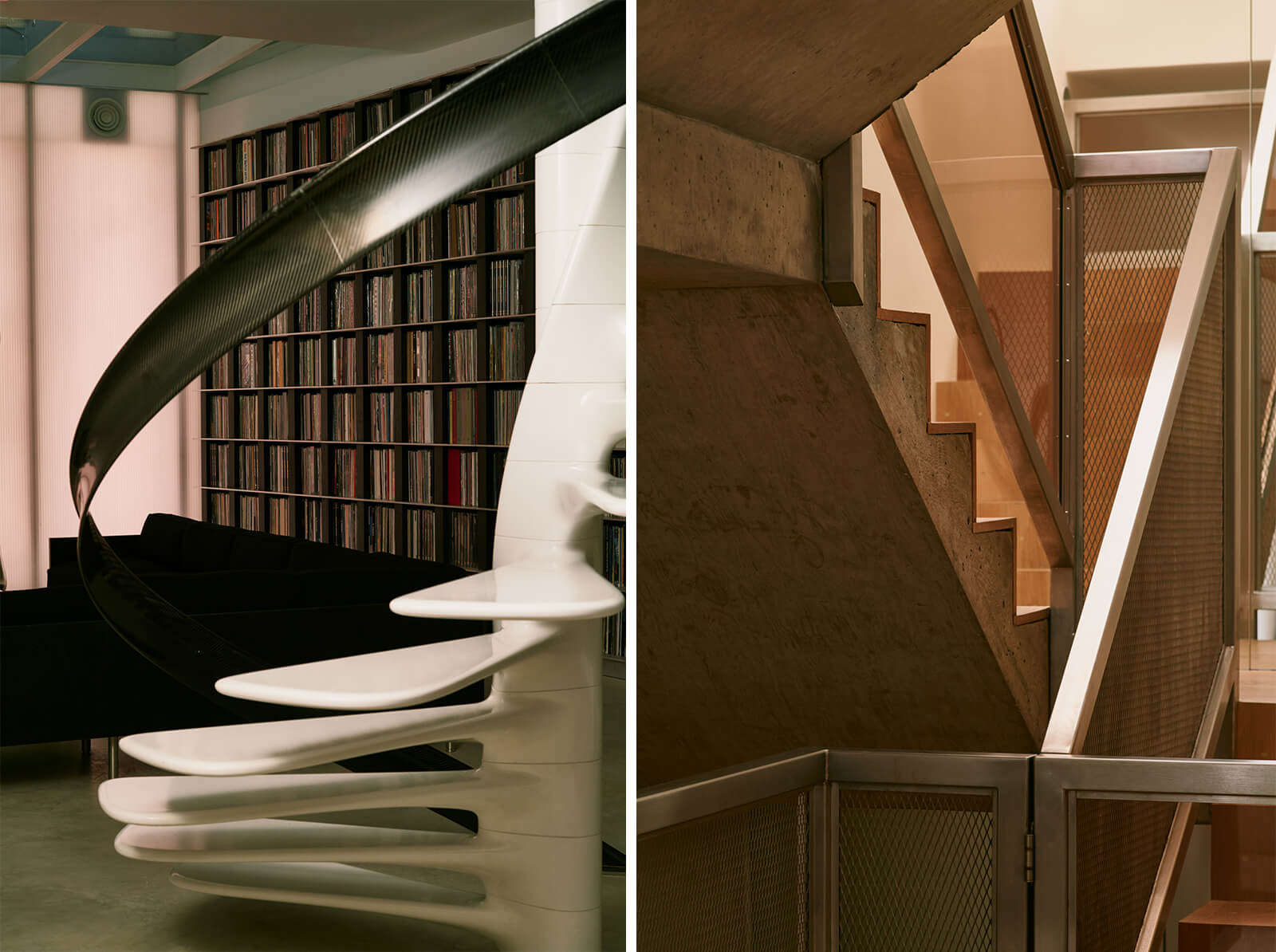10AM Lofts repurposes a warehouse as an event venue and penthouse of contrasts
by Jerry ElengicalAug 31, 2022
•make your fridays matter with a well-read weekend
by Simran GandhiPublished on : Mar 29, 2025
The practice of adaptive reuse in architecture manifests the ingenuity of contemporary design in a dogged pursuit of transforming post-war industrial relics into vibrant, living spaces. Premised on the tenet that every historic structure carries untapped potential, it invites one to reimagine and reconstrue a building’s identity, conceding only what is indispensable and celebrating its inherent character.
Amidst rows of tree-lined historic brick facades with pitched roofs that characterise the Colville Conservation Area in London, one such industrial building underwent a compelling transformation, evolving into ‘a sculptural, multi-layered structure’. Located within a cobbled thoroughfare in Powis Mews, Notting Hill and framed by centuries-old architectural heritage, the Mews House was initially designed by British architect Richard Seifert as a modest factory in the 1950s. The building was later adapted by UK-based industrial designer Ross Lovegrove, demonstrating its innate propensity for reinvention. The recent renovation, endorsed by London-based architectural and interior design practice Arcola Studio and commissioned by British-Canadian music executive Merck Mercuriadis and his wife Sue, exemplifies a balanced allegiance to its industrial heritage while boldly embracing a forward-thinking vision for contemporary living.

The residential design’s history and context weave a succinct narrative from a layout divided between commercial and residential uses, to a reconfigured 490 sqm house that boasts four distinct levels, each with its sculptural staircase replacing the conventional centralised configuration. The ground floor entrance is strategically relocated to cultivate an open-plan kitchen, featuring a monolithic Parota wood table and a reception area with a translucent glass block partition. Meanwhile, the basement is metamorphosed into a lair-like office and listening room accessed through a ribbon-like staircase. It showcases a vast, monolithic LP (vinyl records) storage wall that underscores the space’s industrial descent.
At the uppermost level, a master suite reinterpreted from a former reception area houses an oak-clad dressing room and en suite. The space opens onto a 44 sqm rooftop terrace through a graceful spiral staircase. Each space within the four-bedroom residential interiors is a study in contrasts. Raw industrial elements such as stainless steel, raw aluminium and varied concrete finishes complement rich, earthy textures in intricate oak joinery, mid-century wools and sumptuous velvets.
“All furnishings, except for select antique pieces, were custom-designed for the project to create a fully integrated environment that feels natural and not overly controlled,” Arcola co-founder Sami Jalili shares in an official statement underscoring the studio’s dedication to both interior architecture and design.
The integration of custom-crafted elements in the residential architecture ensures that every spatial nuance preserves and elevates the spirit of the Victorian development, creating a functional and inspiring environment. “The design balances raw industrial materials with rich, earthy textures and tones in browns and ochres, achieving a fusion of natural luxury and high-tech precision,” the press release mentions. This deliberate infusion of cool industrial hues with warm, earthy tones of nature offers an engaging interplay that honours the building’s past and propels it into a future of innovative living.
The renovation architecture of the Mews House is a narrative of bold reinvention, where industrial heritage is commemorated and reconfigured with pragmatic innovation and meticulous craftsmanship. Arcola Studio coalesces history, modernity and personal expression to forge a home that is as much an urban sanctuary as it is a work of art.
Name: Mews House
Location: Powis Mews, Notting Hill, London
Architect: Arcola Studio
Area: 490 sqm
Year of Completion: 2024
by Bansari Paghdar Oct 16, 2025
For its sophomore year, the awards announced winners across 28 categories that forward a contextually and culturally diverse architectural ecosystem.
by Mrinmayee Bhoot Oct 14, 2025
The inaugural edition of the festival in Denmark, curated by Josephine Michau, CEO, CAFx, seeks to explore how the discipline can move away from incessantly extractivist practices.
by Mrinmayee Bhoot Oct 10, 2025
Earmarking the Biennale's culmination, STIR speaks to the team behind this year’s British Pavilion, notably a collaboration with Kenya, seeking to probe contentious colonial legacies.
by Sunena V Maju Oct 09, 2025
Under the artistic direction of Florencia Rodriguez, the sixth edition of the biennial reexamines the role of architecture in turbulent times, as both medium and metaphor.
 surprise me!
surprise me!
make your fridays matter
SUBSCRIBEEnter your details to sign in
Don’t have an account?
Sign upOr you can sign in with
a single account for all
STIR platforms
All your bookmarks will be available across all your devices.
Stay STIRred
Already have an account?
Sign inOr you can sign up with
Tap on things that interests you.
Select the Conversation Category you would like to watch
Please enter your details and click submit.
Enter the 6-digit code sent at
Verification link sent to check your inbox or spam folder to complete sign up process



by Simran Gandhi | Published on : Mar 29, 2025
What do you think?